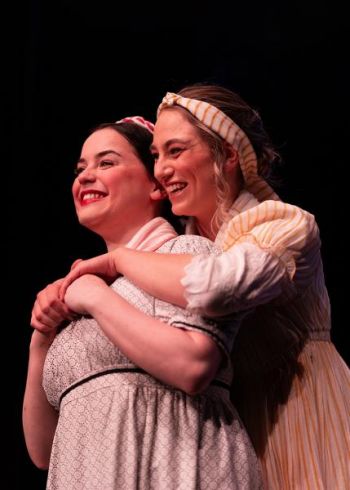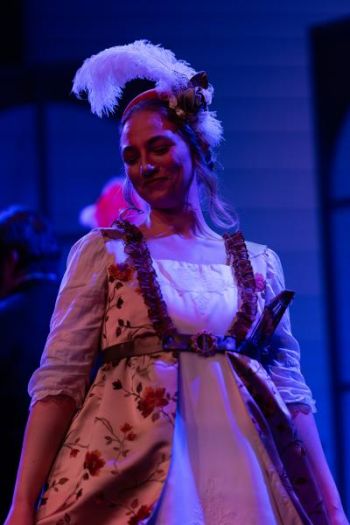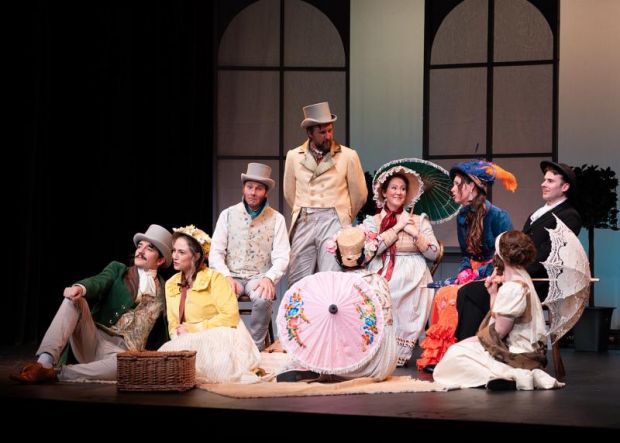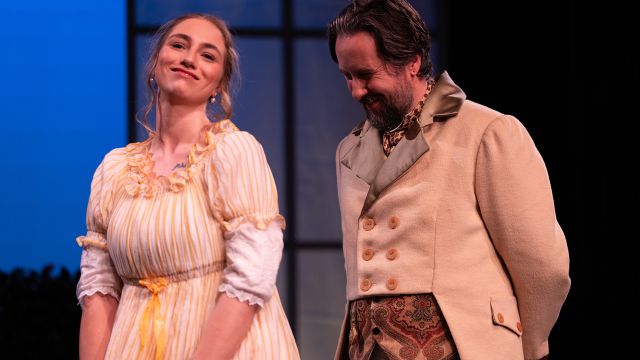Emma
What two letters of the alphabet best express perfection?
Emma by Jane Austen is a well-loved story, notable for the fact that Austen set out to create a flawed heroine yet managed to make her engaging and redeemable. Michael Bloom then aspired to the equally difficult task of compressing this substantial novel into two and a half hours stage traffic.
The novel is written in the close third person. Bloom has chosen to have Emma break the fourth wall in order to facilitate what is lost in the fictional narration. Whilst this may be initially jarring, the audience becomes accustomed to these insights and asides. Signified musically and delivered in a pool of light, these confessionals facilitate audience sympathy and understanding of Emma’s personal growth. Emma is foolish and misguided but never beyond redemption.
 The set is simple. Three window panels are subject to thoughtful lighting. A period piece like this must decide in favour of elaborate and meticulous sets or eschew the inevitably laboured transitions for something more indicative. This simple set provides the latter. The visual appeal comes from Nicole Ottrey’s detailed costumes. Emma’s association with yellow seems to have come from the 2020 film iteration and previously the plaid worn by in Alicia Silverstone in Clueless in 1995. If Emma is the sun, Mrs Elton goes supernova in orange. Mr Elton’s socks did not go unnoticed. Harriet is beautifully demure in country florals and pastels whilst Jane Fairfax is regally restrained. The men’s costumes are given equal attention to that of the women. Hats are on point.
The set is simple. Three window panels are subject to thoughtful lighting. A period piece like this must decide in favour of elaborate and meticulous sets or eschew the inevitably laboured transitions for something more indicative. This simple set provides the latter. The visual appeal comes from Nicole Ottrey’s detailed costumes. Emma’s association with yellow seems to have come from the 2020 film iteration and previously the plaid worn by in Alicia Silverstone in Clueless in 1995. If Emma is the sun, Mrs Elton goes supernova in orange. Mr Elton’s socks did not go unnoticed. Harriet is beautifully demure in country florals and pastels whilst Jane Fairfax is regally restrained. The men’s costumes are given equal attention to that of the women. Hats are on point.
The cast is well chosen to imbue Austen’s characters. Andy Aisbett is beautifully ridiculous as Mr Elton. Tending to caricature, Aisbett is lithe, funny and idiotic. Bloom has written Elton without the darker impulses that might be attributed to the character. There is no carriage scene between Emma and Elton.
Rosie Cann is a corker as Mrs Elton, a bright foil to Emma, totally overshadowing the pallid Jane Fairfax (Emma Skalicky). Skalicky is one of several very accomplished actors cast in roles that offer little scope for their skills. This applies to Brendan Flynn who is a wonderful choice for Mr Woodhouse but the hypochondriac father is a reduced one-note character in Bloom’s adaption. Rhys Prestedge is perfect as the slimy and manipulative Frank Churchill. Andrew Holmes is all the romantic hero ought to be, principled steadfast and rational. Bil Heit is an excellent casting choice as Miss Bates though not nearly as tedious as she is portrayed by Austen. She, along with Prestedge, Cann and Aisbett are the main sources of humour. Taylah Lowry is a charming choice as Harriet Smith and a significant stage presence. The awkward dynamic between Lowry and Jonty Hilton (Mr Martin) is sweet.
 Bloom’s adaptation is funny and faithful to the novel but some narrative is given in the form of dialogue in a stilted manner e.g the Gypsy incident. Harriet relates what befalls her in a clumsy exchange with Frank Churchill. Other moments are glossed over. When Emma visits Miss Bates to apologise, Emma mentions that she is kept waiting but the dialogue moves on to a new subject almost immediately.
Bloom’s adaptation is funny and faithful to the novel but some narrative is given in the form of dialogue in a stilted manner e.g the Gypsy incident. Harriet relates what befalls her in a clumsy exchange with Frank Churchill. Other moments are glossed over. When Emma visits Miss Bates to apologise, Emma mentions that she is kept waiting but the dialogue moves on to a new subject almost immediately.
If Bloom (and not the Bijou production) disappoints at all it is not making the stakes high enough. The Boxhill incident is much less shocking and damming than it ought to be. The bollicking afterwards by Knightley lacks the punch of Autumn de Wilde’s 2020 film. I wanted to see Emma brought low so I could see her rise. I wanted to feel Emma’s shame and mortification. I wanted more trepidation as she waits to apologise to Miss Bates. Bloom gave me less than my money’s worth in that regard. The denouncement was also unnecessarily protracted once Knightley and Emma reach an agreement. But (and I paraphrase Austen here) these disadvantages which might threaten to alloy to our many enjoyments are so unperceived, that they did not by any means rank as misfortunes.
So, what two letters of the alphabet best express perfection? I would like to suggest “B ‘n’ E”.

Benedicta (Bene) McGeown, as the titular character of Emma, owns every scene (and is on stage virtually the whole time). McGeown’s face glows. She physicalises her immature impulses, pouts and smiles and charms and entices all into her orbit. I would have liked to have seen the character squirm more in her humiliation but McGeown’s Emma is never falls so low as to sacrifice the good opinion of those around her.
Anne Blythe-Cooper
Subscribe to our E-Newsletter, buy our latest print edition or find a Performing Arts book at Book Nook.

